May 5, 2024 | 11:42 GMT +7
May 5, 2024 | 11:42 GMT +7
Hotline: 0913.378.918
May 5, 2024 | 11:42 GMT +7
Hotline: 0913.378.918
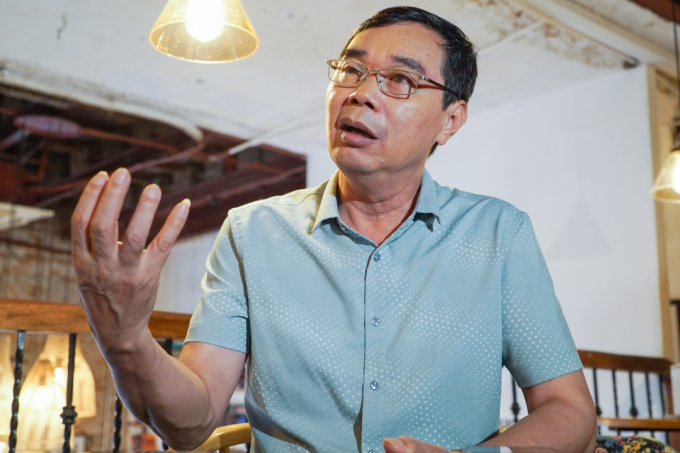
Mr. Ha Van Thang, Chairman of the Board of Directors, T&T 159 Hoa Binh Joint Stock Company. Photo: NNVN.
Currently, the percentage of agricultural by-products collected, processed, and used in our country is limited, causing many wastes.
Wasteful by-products cause environmental pollution and pose a potential risk of disease, value waste, and significant revenue loss in production.
The circular economy brings four specific benefits for sustainable development: Saving resources, protecting the environment, promoting economic growth, and bringing many benefits to society.
In Vietnam, the current understanding of the circular economy in agriculture is not complete and correct.
For example, only 10% of crop by-products are used as local fuels, 5% are industrial fuels, 3% are animal feeds, and 80% are unused and directly discharged into the environment or burned.
To develop a circular agriculture economy associated with green growth, agricultural by-products must be considered renewable resources.
Agricultural by-products are considered an important input source in other circular processes, helping to prolong the value-added chain in agriculture.
Currently, many livestock enterprises are focusing on investing in technological lines to utilize livestock waste sources into organic fertilizers. It not only solves environmental problems but also brings a significant source of income for businesses.
Mr. Ha Van Thang, Chairman of the Board of Directors, T&T 159 Hoa Binh Joint Stock Company, said that currently, the Company's cattle breeding development activities are organized and operated according to the process of the circular agriculture economy.
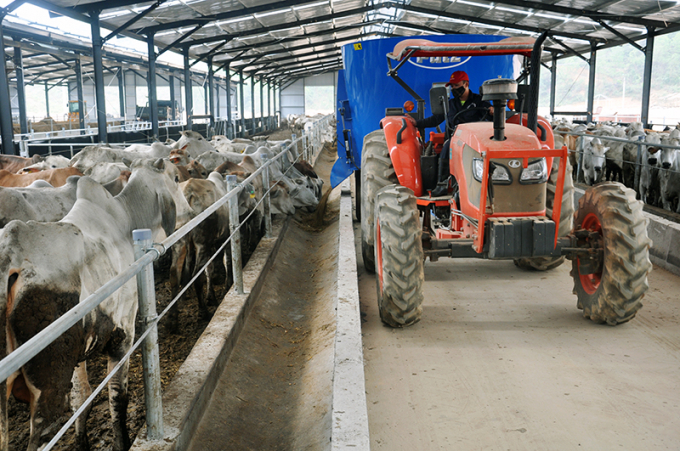
Agricultural by-products at all stages of production are numerous. However, many people do not realize its actual value. Photo: TL.
The circular economy can be understood as a closed economy with no waste. All the waste of the previous production stage is the input to the next step. T&T 159 Hoa Binh Joint Stock Company has taken advantage of the by-products to make microbial organic fertilizer in the breeding process.
This model has been implemented by T&T 159 Hoa Binh Joint Stock Company for 5-6 years. During the implementation process, the Company gradually learned from experience and perfected the process. Moreover, with the philosophy of not wasting any agricultural by-product, the Company has invested in biotechnology in waste treatment.
"We use biotechnology to process the by-products of animal feed production; things that cannot make food will be treated as biological cushions," said Mr. Thang.
According to Mr. Ha Van Thang, the circular economy needs flexibility, especially solutions. The implementation process is always innovative, creative and requires appropriate waste collection technology.
Agricultural by-products at all stages of production are numerous. However, many people do not realize its actual value. Companies have to spend a lot of money to separate waste, so production costs increase.
"The economic value is not high; the profit is not attractive, so many people have ignored agricultural waste. It is wasteful and difficult for those who are researching and applying the circular economy," Thang emphasized.
On the legal side, the circular economy is well known but not widely disseminated.
When building a large farm in animal husbandry, it is necessary to have an environmental impact assessment report based on the current Law on Environmental Protection and other relevant guidelines, decrees, and circulars.
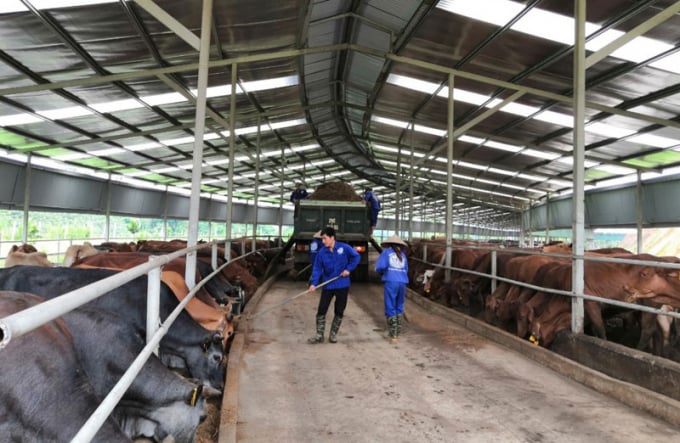
The cow farm in T&T 159 Hoa Binh Joint Stock Company. Photo: TL.
When treating waste in livestock, the Company uses biotechnology, so wastewater is fully utilized. However, the farm needs to have a reservoir, a drainage system, a biogas cellar.
Mr. Ha Van Thang shared that he wants the circular economy to be widely developed. Everyone sees the benefits, but not everyone is ready to reach out and make it a reality.
To promote circular agriculture, companies need to continue to perfect the linkage chain to ensure efficient operation.
T&T 159 Hoa Binh Joint Stock Company is currently organizing many models of family groups, cooperatives, etc., to build material areas and continue to collect agricultural by-products. As a result, the Company is relatively proactive and not broken in terms of input materials for livestock. Besides, the Company maximizes the potential of the by-products.
"Doing a circular economy must always determine that there is no waste; the waste of the first stage must be an input for the second stage," emphasized Mr. Ha Van Thang.
However, according to Mr. Thang, the most incredible difficulty now is no fundamental policies and regulations to encourage businesses to do the circular economy. Farmers do not have many conditions to study the provisions of the law carefully. In addition, suitable and easily applied waste treatment technology in many different fields is also essential.
If developing businesses implement a fast circular economy, they will be able to make full use of resources, restore balance to the ecosystem, and protect the environment. Therefore, state management agencies need to pay attention to creating more favorable conditions, prioritizing businesses doing circular agriculture models.
Translated by Ha Phuc
/2024/05/04/0940-1-145947_475.jpg)
(VAN) The Prime Minister requested MARD to proactively direct flexible solutions to remove difficulties, ensure production, and promote consumption and export of agricultural, forestry, and fishery products.
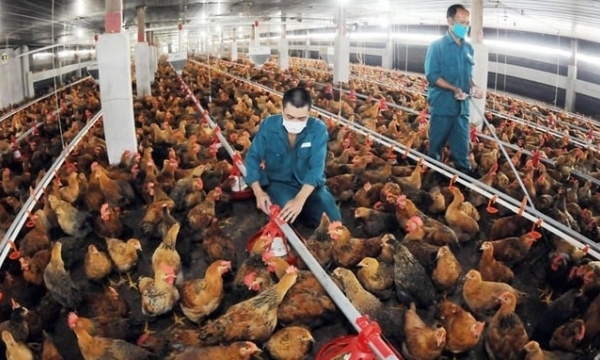
(VAN) Ministry of Agriculture and Rural Development held a conference to deploy some prioritized schemes to implement the Strategy for Livestock Development for the period of 2021-2030 with a vision to 2045.
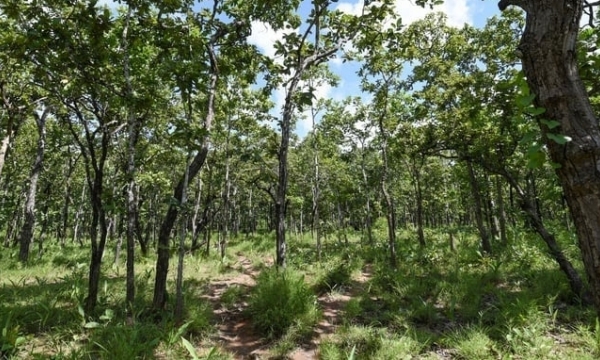
(VAN) The Ministry of Finance will coordinate with the Ministry of Natural Resources and Environment to finalize the project under Directive No. 13/CT-TTg issued by the Prime Minister on May 2nd.
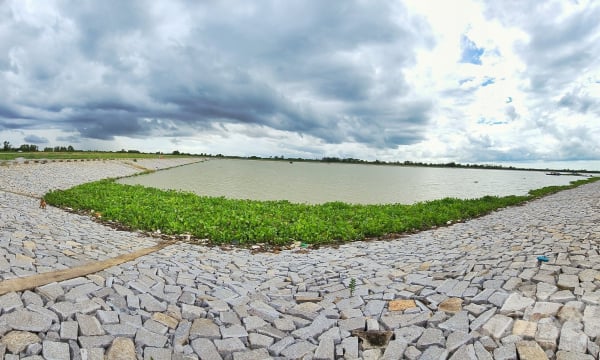
(VAN) Underground water – the huge freshwater reserves of Mekong Delta is facing the risks of salinity. The long-term solution to control and prevent the exploitation of underground water must be caculated.
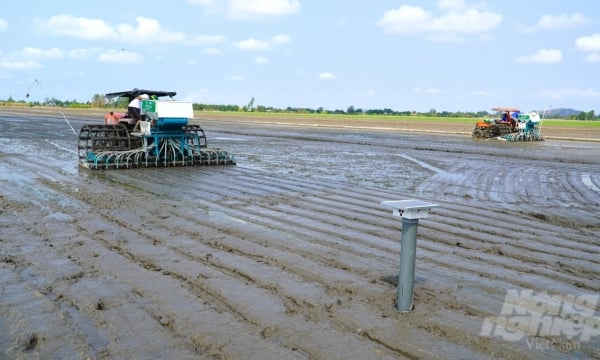
(VAN) In addition to technical support, farmers participating in the pilot model of the 1 million hectares of high-quality rice project will be supported with all materials and infrastructure.
/2024/05/03/2341-2-152131_770.jpg)
(VAN) 'Not every place can combine marine farming and tourism, but wherever we can do, we should do', Dr. Nguyen Chu Hoi said.
/2024/05/03/4925-2-074727_158.jpg)
(VAN) Across the country, there have been 15 forest fires occurring in the provinces of Son La, Dien Bien, Lai Chau, Quang Tri, Nghe An, Ca Mau, Kien Giang, An Giang, etc.